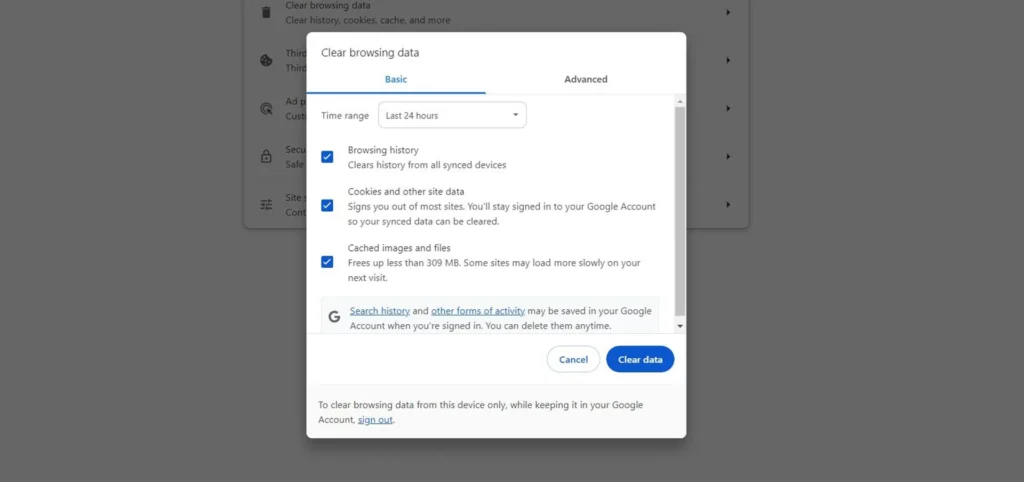
We’ve all been there. You’re scrolling through the web, casually browsing for a new pair of running shoes (because, let’s face it, that treadmill isn’t going to break itself in).
Suddenly, a strange phenomenon occurs.
As if by magic, ads for those very same running shoes start popping up on every website you visit. News sites? Sports blogs? Even your friend’s favourite recipe website? Running shoes. Everywhere.
But fear not – there’s no harm to be done by something like this. The culprit behind this is a tiny piece of code with a surprisingly sweet name: a cookie.
Let’s explore more, in this Hostopia blog.
- What Are Cookies?
- Third-Party Cookies vs. First-Party Cookies: “Digital Breadcrumbs” That Leave a Trail
- What About Persistent Cookies?
- How Tracking Cookies Can Help Small Businesses
- Why Google Might Ditch Cookies?
- Beyond the Cookie Jar: What’s Next for Online Tracking?
What Are Cookies?
While it doesn’t involve chocolate chips, cookies are small pieces of data stored on your computer or mobile device that contain any activity, login information, purchase history, and other site data on websites you visit.
They’re created by all the modern web browsers you use to access the internet, such as Google Chrome, Mozilla Firefox, or Safari.
When you visit a web page, its web server asks whether you consent to using and storing your preferences, such as site and advertisement settings on your computer. This is done via the usual cookie popups when you first visit the site.
After consenting to using and storing your personal information on your device, the web server signals the user’s browser to create a cookie so you don’t have to answer all the questions again in the future.
This information is then used by the website to provide you with a more personalized browsing experience, such as remembering your username and password or showing you targeted advertisements based on your interests.
While third-party cookies can be helpful, they can also be used for nefarious purposes, such as tracking your online movements without your consent.
Third-Party Cookies vs. First-Party Cookies: “Digital Breadcrumbs” That Leave a Trail
Just like the popular fairy tale, every website you visit leaves a trail of cookies behind. These are first-party cookies placed by the web servers (or websites, if you prefer) you interact with directly, but they’re mostly harmless.
They might remember your language and region preference or the items in your shopping cart.
Now imagine the same scenario, but there are lots of different cookies present on the same website harvesting (perhaps the same) statistics as the website owners.
This is a perfect example of third-party cookies. They’re placed by companies entirely separate from the websites you visit. They track your movements across different sites, building a detailed profile of your interests – a profile they can then sell to advertisers.

(source)
There’s a myriad of other related examples of how internet cookies can track user preferences from your web browser.
Ever searched for a specific vacation destination and then been bombarded with hotel ads on every website you visited afterward? That’s thanks to cookies.
They can be helpful, though. Imagine searching for a birthday gift for your tech-savvy friend. Cookies might suggest related products like headphones or a new phone case, making your shopping experience a breeze.
Session Cookies
An equally important cookie type is session cookies.
As their name suggests, these are able to track whole user sessions on a particular website and associate that activity with a specific account. By doing so, session cookies can help websites provide more personalized experiences, such as remembering items in a shopping cart or keeping a user logged in to their account.
While most cookies on a user’s web browser are there to track user activity and behaviour, session cookies can keep a user’s session regardless of network changes or IP changes that occur very often.
Therefore, session cookies present a new opportunity for hackers to gain access to a user’s information by stealing that session cookie. One great example involves trending YouTube channels getting hacked with this sophisticated method by hijacking their accounts via targeted malware attacks.

What About Persistent Cookies?
Now, let’s delve deeper into the world of cookie crumbs. We’ve talked about first-party cookies, and those friendly bakery treats left behind by the websites you visit directly. But there’s another type of cookie with a bit more staying power: the persistent cookies.
Think of a persistent cookie as a particularly stubborn crumb. It sticks around on your device long after you’ve closed your browser, hence its name. These cookies have an expiration date set by the website, which can range from a few days to a few years. They remember things like your login information, website preferences, and even shopping cart contents across multiple visits.
So, are they harmful?
Persistent cookies play a double-edged sword. On the one hand, they offer convenience. Remember those websites that greet you with a personalized welcome after you’ve logged in? That’s a persistent cookie at work, saving you the hassle of re-entering your credentials every time.
They can also personalize your online experience, remembering your preferred language or layout on a particular website.
However, the flip side of convenience is privacy. Persistent cookies, particularly those from third-party sources, can create a detailed profile of your browsing habits over a long period.

How Tracking Cookies Can Help Small Businesses
While the privacy concerns surrounding third-party cookies are valid, it’s important to remember that cookies, particularly first-party cookies, can be valuable tools for small businesses when used responsibly. Here’s how:
- Personalized customer experiences: Imagine a local bakery remembering your favourite pastry order or a clothing store suggesting similar styles you previously browsed. First-party cookies can help small businesses personalize the online experience for their customers, fostering a sense of familiarity and encouraging repeat visits.
- Targeted (but relevant) advertising: Cookies can be used to show targeted ads to potential customers who have already expressed interest in your products or services. This is different from the nefarious, all-encompassing tracking we mentioned earlier. For example, a small bookstore can use cookies to show ads for a new mystery novel to customers who previously browsed their mystery section, increasing the chances of reaching a relevant audience.
- Website optimization: Tracking cookies can be used to measure user behaviour on a website, helping small businesses understand how visitors navigate their pages. This data can be used to optimize the website layout, improve functionality, and ultimately lead to a more user-friendly experience that keeps customers coming back.
- Measuring marketing success: Cookies can be used to track the effectiveness of marketing campaigns. A small business can see how many people clicked on their ads or social media posts, allowing them to refine their marketing strategy and allocate resources more effectively.
Why Google Might Ditch Cookies?
The internet used to be a lawless frontier, like the Wild West. Companies collected user data with little oversight. But the winds of change are blowing, and user privacy is becoming a top priority.
People are increasingly wary of the vast amount of data being collected about them online, and the feeling of being constantly tracked is starting to grate. Imagine walking through that bustling marketplace again, but this time, hidden cameras are recording your every move.
This growing unease with data collection has led to regulations like the General Data Protection Regulation (GDPR) in Europe and the California Consumer Privacy Act (CCPA) in the US. These regulations empower users with more control over their data and make companies more accountable for how it’s collected and used.
In this landscape of data privacy, choosing a reliable web hosting provider that prioritizes security and user data protection is crucial for businesses. Hostopia offers secure and privacy-focused web hosting solutions to empower businesses to navigate the changing online landscape with confidence.
Google’s decision to phase out cookies is a response to this shifting landscape. They’re recognizing that the current model of the internet isn’t sustainable, and a more privacy-focused approach is needed. This no-cookie-trend is set to be followed by other tech giants as well.
So, in short, Google might phase out cookies for the following reasons:
- Privacy concerns
- Improved browsing security
- User control over data
- Alternative options will take over
But don’t expect this to happen soon, as Google mentions that it will not be before 2025 until we see these changes take effect.

Beyond the Cookie Jar: What’s Next for Online Tracking?
With the cookie jar seemingly headed for the shelf, what’s next for online tracking? Enter Google’s Privacy Sandbox, a treasure trove of proposed alternatives that aim to balance user privacy with the need for targeted advertising. These alternatives are still under development, but some possibilities include:
- Privacy-preserving ad targeting: This approach focuses on analyzing groups of users with similar interests rather than individual profiles. Imagine showing ads for hiking boots to everyone who recently browsed outdoor gear websites without needing to track a user’s browsing history.
- Federated learning: This involves training algorithms on user devices without directly sharing individual data. Think of it like a classroom where students learn from a shared pool of knowledge without revealing their own personal test scores.
While a cookie-less future presents challenges, it also emphasizes the importance of first-party data, website analytics, and having your business on major directory listing platforms.
That’s why Hostopia comes equipped with robust Online Directory Management that allows businesses to get found across 50+ directories, including Google Maps and Yelp, and extend their SEO efforts greatly.
Are you excited about your website’s potential? Contact Hostopia to learn more: learnmore@hostopia.com
Conclusion: A Cookie-Less Future
The potential impact of a cookie-less future is a hot topic.
Businesses that rely heavily on personalized advertising might face challenges in reaching their target audience without the use of browser cookies.
However, there are also potential upsides. Consumers can expect a more private online experience, free from the constant feeling of being tracked. End users have total control over their browsing history and they can delete cookies at any time they see fit.
User consent and privacy-conscious marketing practices are the key to navigating this new landscape. For example, a user might block cookies or have them turned off by default so businesses can’t build a profile on this user’s browsing habits. Businesses will need to focus on building trust with their customers and offering value-driven experiences that attract them organically.
This might involve focusing on high-quality content marketing, building strong email marketing lists with user consent, and exploring alternative advertising options that prioritize user privacy.
The future of online tracking is still being written, but one thing’s for sure: the days of the third-party cookie crumb trail are numbered. By embracing a privacy-first approach, both businesses and consumers can benefit from a more secure and user-centric internet.
Hostopia has helped countless businesses reach their goals. Do you want to become our partner and find out? Contact us at learnmore@hostopia.com
